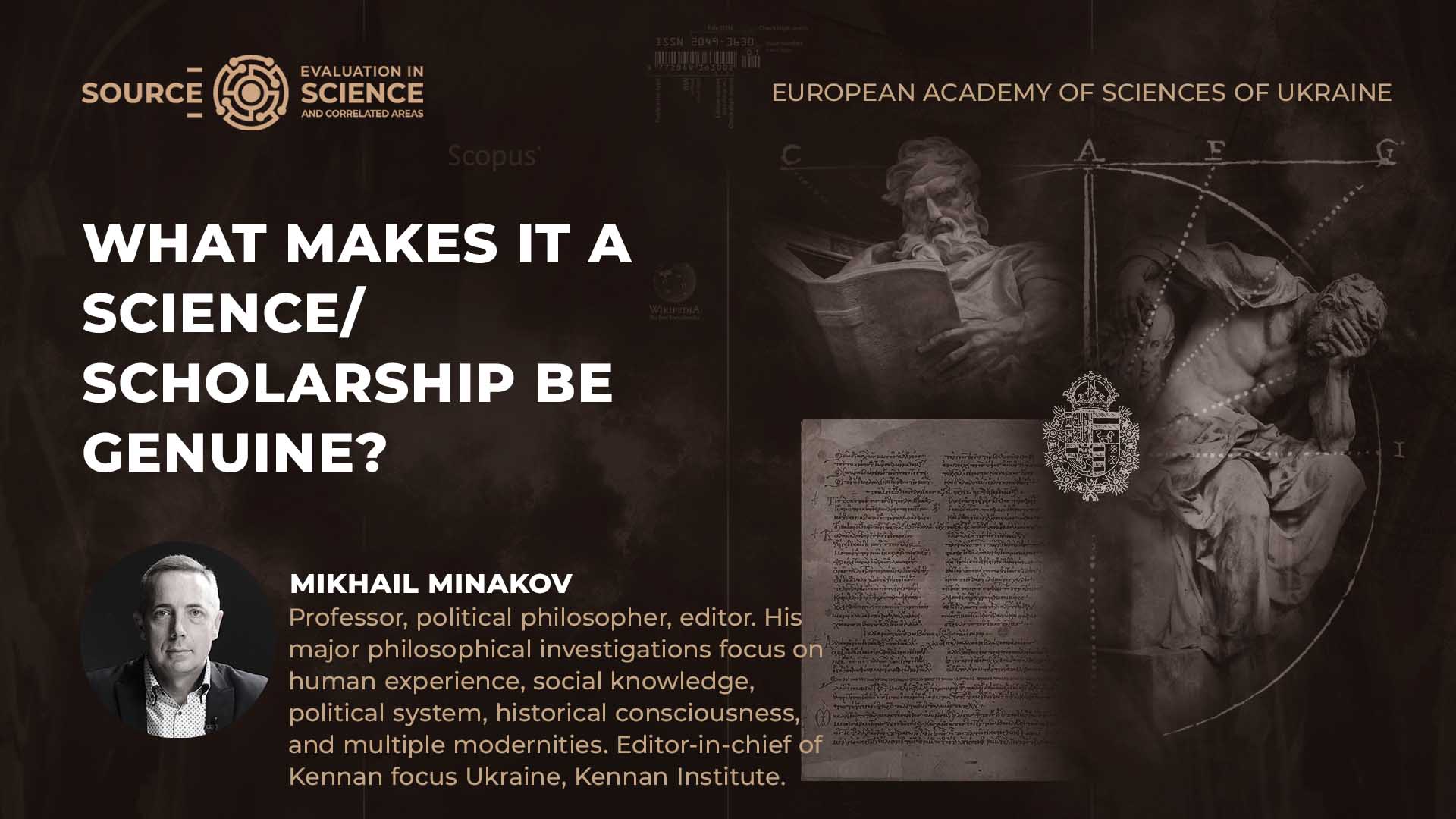What makes it a science/scholarship be genuine?

A report by Dr. Mikhail Minakov, Senior Fellow, Kennan Institute
Science as a long-living, transcultural intellectual practice — that includes exact, natural, and social sciences, as well as humanities — has its own history and thus different historical forms. Among those are the antique, classical, and postclassical science-forms. However, I argue that even though the ideals of science were changing and thus the meaning of science may seem relative, its core authenticity remained untouched and definite, in all historical periods it was true to its genuine idea — adherence to truth.
The antique science was open equally to mysteries, facts, logic, and mythological beliefs. In this period methodology was easily mixing with rituals, like in the texts by Democritus: see, e.g., his statements on the connection between the fertility of a field after it was ritually ran around by a pregnant woman (Taylor 1999: 233). However, Democritus will insist that
“There are two ways of knowledge, one genuine, one imperfect. To the latter belong all the following: sight, hearing, smell, taste, touch. The real is separated from this. When the imperfect can do no more—neither see more minutely, nor hear, nor smell, nor taste, nor perceive by touch with greater clarity — and a finer investigation is needed, then the genuine way of knowledge comes in as having a tool for distinguishing more finely.” (Taylor 1999: 223)
Democritus, as well as Plato, Aristotle, and Cicero shared same scientific ideal: the genuine science deals with what is eternally unchangeable and universal, like the foundations of mathematics and geometry.
The ideal of universality was treated as the one that demands metaphysics. There is a fundamental division of the being on the world of ever-changing reality and the world of eternal ideas that relate to changeable world as its cause and archetype (see: Plato B23, Aristotle B1:1). And the knowledge of ideas and causes constitutes the true science or the art of wisdom:
“Again, we do not regard any of the senses as Wisdom; yet surely these give the most authoritative knowledge of particulars. But they do not tell us the ‘why’ of anything-e.g. why fire is hot; they only say that it is hot.” (Aristotle B1:1).
In many ways the classical science — from Isaac Newton to Sklodowska–Curie — was looking at the world as a united three-dimensional universe with the causal relations defined as the laws of nature. The genuine science was seen in natural and in exact sciences, while social sciences and humanities were lacking the laws and the vision of united reality (see, e.g. Newton 1934: 15).
However, the classical universal ideal of science was constantly discussed between rationalist — followers of Descartes — and empiricists (including Bacon and Locke). Furthermore, classical scientific ideals were constantly attempted to be applied to society and culture by Vico, Kant, Cohen, and Dielthey.
As a result of paradigmatic change in the ideas and methods of sciences in early 20th century, science has entered its brave new — postclassical — epoch. From Einstein and Bohr to todays scholarship we witnessed growing disciplinary divisions and interdisciplinarity, understanding of scholarship as subjective and intersubjective labor, involvement of relativity — from methodology to cosmogony — and doubts in eternity of the universe. Postclassical methodology is based on a worldview of torn, changeable, and ever-unfinished knowledge where truth is permanently undefined, plural, and unstable.
I listed here three historical contexts with different understanding of science and knowledge. In the past there were many more other periods in other different cultures where scientific ideals were seen differently. However, it does not mean that the genuine scientific ideal is temporarily and culturally relative. The real solution to relativist doubts in science is in the pragmatic understanding of science as co-presence of real and ideal scientific communities, as once offered by C. S. Peirce (Peirce 1998: 28ff).
Here I continue Pierce’s argument that science is a intercultural, multigenerational practice which was, is and will be practiced by a community of humans relating their actions to scientific ideals of truth, argument, judgement, and universality. Basically, from antiquity until today we know about scholars, not science as some separate entity. On one hand, the community of scholars in all periods acts as if their conclusions are always universal and final; without such assuredness there is no meaning in science. On the other hand, sociology of science shows how fast the knowledge in different disciplines gets outdated: for example, in medicine, the knowledge changes every two years, in physics — every five years etc. (see, e.g. Ball 2019). This duality of the scientific knowledge is rooted in the nature of humans — beings with rationality, emotions, and tendency to fight for power also in the scientific communities. For that reason, the ideal of eternal truth is being practiced together with limitedness of concrete individuals, groups, and institutes. Here we always have dominant and marginal positions which undermine equality of those looking for truth. But with time this social deviation from scientific ideal is being rectified and thus the science progresses on.
So my conclusion is that the genuine science is the practice that aims at universally established true knowledge that can be reviewed by any other rational being, but at the same genuine scholars remember about their limitedness and about the need to be ready for re-working on their research by themselves or by colleagues that may rectify their previously established knowledge.
References:
Aristotle. (1924). Metaphysics, ed. W.D. Ross. Oxford: Clarendon Press.
Ball, P. (2019). Science must move with the times. Nature, November, https://www.nature.com/articles/d41586-019-03307-8.
Newton, I. (1934). Sir Isaac Newton’s Mathematical Principles of Natural Philosophy and His System of the World. Berkeley: University of California Press.
Peirce C. S. (1998), The Essential Peirce, Vol. 2: Selected Philosophical Writings: 1893-1913, Bloomington: Indiana University Press.
Plato: Meno. Perseus, http://www.perseus.tufts.edu/hopper/text?doc=plat.+meno+70a.
Taylor C.C.W. (1999). The Atomists: Leucippus and Democritus. Fragments, A Text and Translation with Commentary. Toronto: University of Toronto Press.
